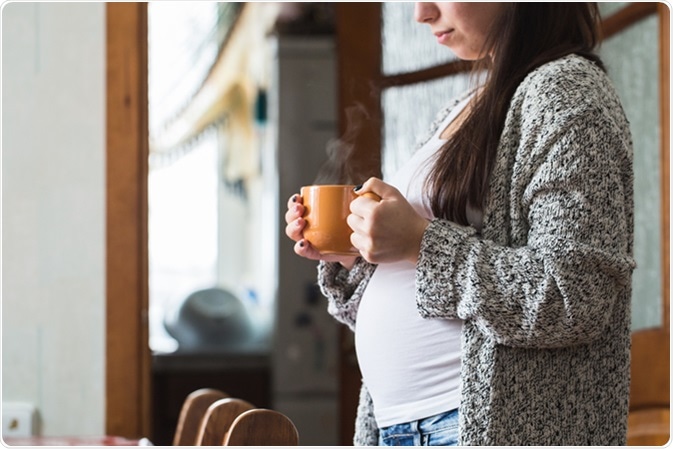Why is Caffeine Dangerous During Pregnancy?

Caffeine is a stimulant that acts on the brain and the nervous system. Caffeine consumption can increase the BP and heart rate, in addition to making one feel awake. Consumption of large amounts of caffeine can result in anxiety and restlessness, and can even cause headache and insomnia.
Regular consumption when stopped suddenly may cause withdrawal symptoms such as fatigue, irritability, and lack of clarity.
Limiting the consumption of caffeine during pregnancy is crucial to reduce the risk of health issues for the baby. High levels of caffeine in pregnant women can even cause a miscarriage.

Common Sources of Caffeine
Caffeine is naturally found in the following foods / drinks:
- Coffee
- Tea
- Chocolate
Caffeine is added to:
- Cold and flu remedies
- Energy drinks
- Soft drinks, such as cola
What Does Caffeine do to the Body?
Caffeine causes acid release in the stomach and leads to an upset stomach. It is also a diuretic that will get rid of body fluids faster. However, studies have reported mixed results.
Some say that caffeine intake of over 300 mg/day might interfere with conception, while an intake of about 200 to 300 mg/day does not influence conception much. However, most experts say that low caffeine levels should be fine during pregnancy as long as women drink enough water and keep themselves well-hydrated.
Most studies on caffeine use during pregnancy failed to find a correlation between caffeine intake and a higher risk of miscarriage. Some studies concluded that consumption of large amounts (more than 800 mg a day) of caffeine along with smoking and alcohol consumption might increase the chances of miscarriage in pregnant women. Overall, the studies concluded that there is no sufficient evidence of a direct association between higher risk of abortions and caffeine intake, especially in the less than 300 mg per day group.
Again, studies could not establish a clear connection between caffeine intake during pregnancy and a higher risk of birth defects in the baby. However, according to some reports, mothers whose caffeine intake was over 500 mg/day are likely to give birth to babies with faster heart and breathing rates, and babies who are awake for a longer time in the first few days after birth.
Most of these studies could not find any correlation between mother’s caffeine intake during pregnancy and behavior or learning ability of children either.
Therefore, consumption of up to 2 cups of coffee per day can be considered to be safe in pregnant women.
Effects of Caffeine on the Body
Caffeine interacts with many receptors such as adrenergic, adenosine, serotonin, and cholinergic γ-amino butyric acid (GABA) receptors. Caffeine consumption during pregnancy and lactation is a cause of concern because, in theory, caffeine easily crosses the placental barrier, and babies cannot metabolize caffeine until they are at least 3 months old.
Once caffeine crosses the placenta, the rate at which it is metabolized decreases during pregnancy. Only very high amounts of caffeine were seen to cause illness in the fetal rat, and humans are highly unlikely to ingest such high amounts of caffeine. Studies also found that in most cases, caffeine was not the only factor; other factors like maternal age, drinking, and smoking habits also played a significant role.
A British Medical Journal paper reported in 2003 that Danish women who said they consumed 8 plus cups of coffee per day had a higher rate of fetal death in the last trimester of pregnancy. However, estimating fetal exposure to caffeine is not as easy as it is thought to be, because cup sizes vary, and the method of preparation of the coffee also differs.
Also, the caffeine content of various brands of coffee and tea varies widely, and the rate at which the liver clears caffeine also differs greatly, as clearance is faster in smokers, and is also affected by genetic polymorphisms.
Tips for Reducing Caffeine Intake During Pregnancy
- Try drinking juice, water, or decaffeinated coffee / tea
- Cut down on energy drinks which are high in caffeine
- Talk to your pharmacist or physician before taking medicines for flu or cold
Sources
- https://mothertobaby.org/fact-sheets/caffeine-pregnancy/pdf/
- www.nhs.uk/…/limit-caffeine-during-pregnancy.aspx
- https://www.healthdirect.gov.au/caffeine
- https://www.ncbi.nlm.nih.gov/pmc/articles/PMC1804190/
- https://www.ncbi.nlm.nih.gov/pmc/articles/PMC3625078/
Further Reading
- All Caffeine Content
- What is Caffeine?
- What is Decaffeination?
- Caffeine Occurrence
- Caffeine Pharmacology
Last Updated: Aug 23, 2018

Written by
Susha Cheriyedath
Susha has a Bachelor of Science (B.Sc.) degree in Chemistry and Master of Science (M.Sc) degree in Biochemistry from the University of Calicut, India. She always had a keen interest in medical and health science. As part of her masters degree, she specialized in Biochemistry, with an emphasis on Microbiology, Physiology, Biotechnology, and Nutrition. In her spare time, she loves to cook up a storm in the kitchen with her super-messy baking experiments.
Source: Read Full Article